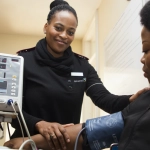
Apple Watch Helps Doctors Discover Heart Tumor
At first, she thought the alerts must be a fluke. But an ER visit led to a startling diagnosis.
By A. Pawlowski
Kim Durkee started wearing an Apple Watch two years ago to monitor her steps and get help in case she fell.
She never expected it to detect the first signs of a life-threatening condition that required open-heart surgery to prevent a stroke.
“I didn’t have one single hint that there was something wrong in my body, not one,” Durkee, 67, who lives in Solon, Maine, told TODAY.
“Doctors said I was like a silent time bomb.”
No hint, that is, until her Apple Watch suddenly started buzzing on her wrist in the middle of the night in late May. Durkee, who wore the gadget when she slept, woke up to a message warning her that she appeared to have an irregular heart rhythm that suggested atrial fibrillation.
Also known as AFib, the condition happens when the upper chambers of the heart aren’t coordinated with the lower chambers, causing the heart to beat too slowly, too quickly or irregularly, according to the Centers for Disease Control and Prevention. That can lead to blood clots, stroke and heart failure, the American Heart Association warned. At least 2.7 million Americans are living with AFib, it noted.
At first, Durkee thought the alerts must’ve been a fluke. She said she didn’t feel her heart racing or doing anything strange, and she was breathing fine. Still, when the same alert kept waking her up three nights in a row, with five separate messages from midnight to 4 a.m. on the third night alone, she decided to get medical help.
On June 3, Durkee went to the emergency room of her local hospital and explained to the doctor on duty that her smartwatch told her to get checked out.
“And he looked at me, like, ‘Really, your watch told you you have AFib?’ Everybody in the hospital was amazed. I was like the talk of the hospital,” she recalled.
“He did some tests and he said, ‘Your watch is right, you’re in AFib.’”

‘I believe it saved my life’
But there was much more to the story. When doctors ran tests, they found some odd readings and performed an echocardiogram, a test that uses ultrasound technology to create images of the heart.
That’s when they discovered that Durkee had a tumor growing in her heart. The diagnosis: myxoma, a non-cancerous growth in her left atrium. Symptoms can include breathing difficulties, chest pain and dizziness. It’s not clear what causes most of these tumors, but they’re exceedingly rare, with less than 0.02% of people affected, studies have found.
Still, a cardiac myxoma is the most common primary heart tumor in adults and can be life-threatening if it interferes with heart function, according to the Cleveland Clinic.
That’s what was happening in Durkee’s case, she said. The tumor was in the way of her heart’s normal rhythm, disrupting the regular contraction-relaxation cycle and causing an arrhythmia. She needed surgery at a Boston hospital to remove the tumor.
When Durkee asked her surgeon what would have happened if she didn’t get the smartwatch alert and didn’t get checked out, since she had no symptoms, “he said, ‘You probably would have had a massive stroke and died,’” she recalled.
The five-hour open-heart surgery took place on June 27. One month later, Durkee is recovering well and wearing her smartwatch 24/7.
“I believe it (saved my life) 100%,” she noted. “It never comes off. … It’s like my security guard.”
Smartwatches are a ‘double-edged sword’
Study findings on how much people benefit from their Apple Watch detecting atrial fibrillation have been mixed. When researchers at Cedars-Sinai in Los Angeles analyzed data from more than 2,000 patients who synced their Apple Watches to electronic health records, they found only 0.25% of them qualified for medication to lower their stroke risk — even if the gadget had flagged AFib.
That’s because most of the wearers tended to be young, healthy and at low risk for a stroke, according to the study, published this year in the Journal of the American Medical Informatics Association.
“Identifying patients with suspected AFib does not necessarily warrant starting a medication to help prevent a stroke,” said Dr. Joshua Pevnick, co-director of Informatics at Cedars-Sinai and co-author of the paper, in a statement.
A large study funded by Apple found the probability of receiving an irregular pulse notification from the watch was low: Only 0.52% of the almost 420,000 participants enrolled received that alert. In that group, 34% of individuals were later found to have atrial fibrillation.
Dr. Andrew Freeman, a cardiologist at National Jewish Health in Denver, Colorado, previously told TODAY that he considered smartwatches a “double-edged sword” because they can collect important health data, but also lead to information overload for patients and their doctors.
Still, “if you do notice that your vital signs are ever out of whack … it’s good to get them checked out,” he said.
Image: Courtesy of Kim Durkee







